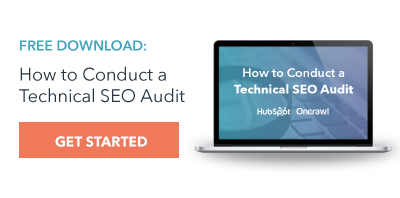Google ranking factors are constantly changing, but links remain one of the most critical factors used by search engines.
If you want your website’s pages to rank in search and attract tons of organic traffic, you will undoubtedly need links.
Good links are like “votes”, which help search engines identify the best content to show for specific search queries.
There’re tons of link building strategies you can try depending on your goals and needs. With some strategies, you can get those important “votes” and increase referral traffic and gain more visibility for your company.
At Hunter, we’re constantly improving our link profile and getting more visibility for our brand. We’ve tested tons of link-building strategies, and there’s one that showed us the best results — link building via “best” listicles.
In less than three months, we got 96 new links from 54 domains, were mentioned in 33 new product listings, and upgraded our positions in 17 listings.
How did we do it? Read this guide, and I’ll show you how we implemented this strategy step-by-step.
First things first: What are “listicles”?
A “listicle” is an article made of a list — typically with some kind of extra detail below each item. This is a popular format to review products or services as it’s easy to skim to find important information.
Titles tell you what to expect (e.g., each title could be the name of the product or service), and each paragraph/chapter has a similar format, making it easy to compare many items quickly.
Here is an excellent example of a listicle created by HubSpot: Sales Prospecting: 26 Tips, Techniques & Tools to Succeed.
This is a review of the best techniques and tools for prospecting, which has a similar structure and approach to each product.
Why is it essential for you to get featured in listicles?
Listicles are powerful tools for product comparison and independent views on specific products or services.
Just imagine: You’re new to sales prospecting. You barely know anything about the popular tools on the market, and you need to find the best one for your team. To get some information about the topic you don’t know much about, you typically go to Google and type in something like “best prospecting tools” or “best sales prospecting tools review.”
You click “search” and stumble upon a similar search result page which consists mainly of listicles:
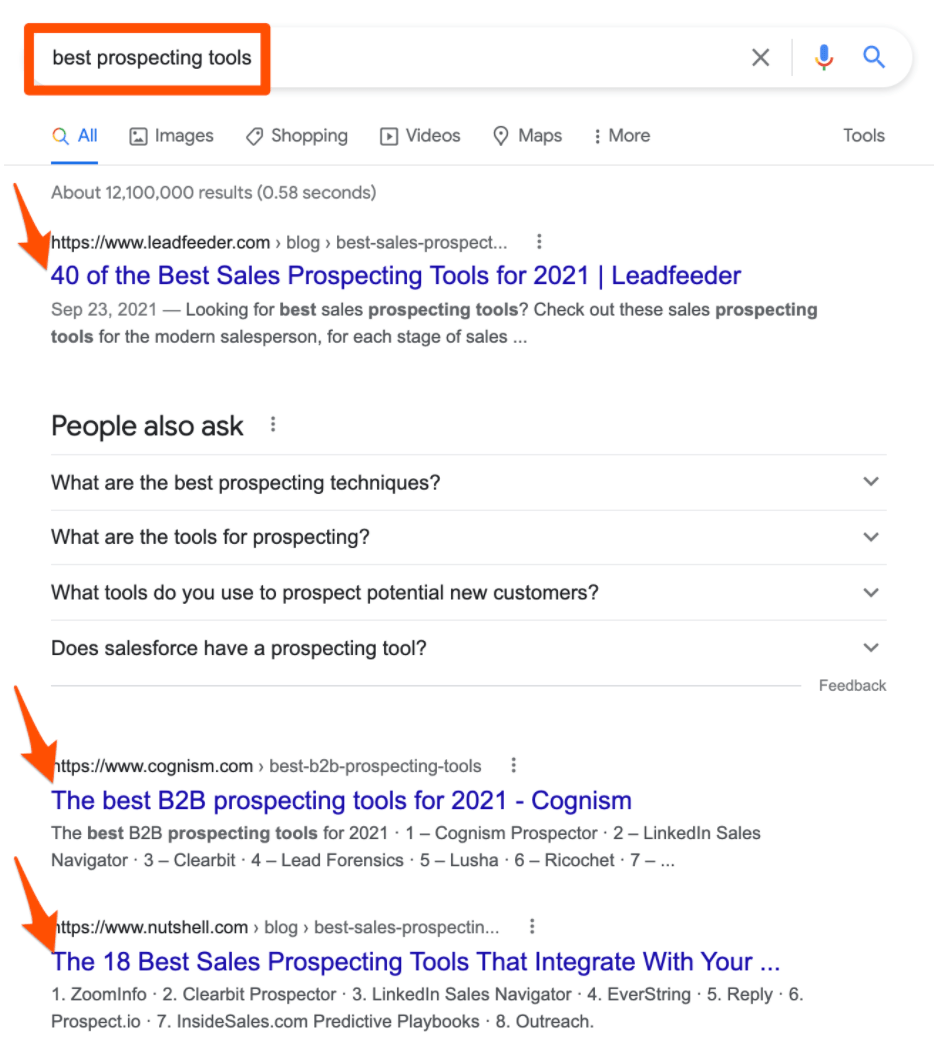
At Hunter, our key product is related to sales prospecting, and we wanted to be present in many listicles (especially those that generate high organic traffic).
By appearing in those listicles, you can get:
- More visibility for your brand: Just imagine someone searching for “best [your product/service].” You appear number one on Google in the first independent listicle and are mentioned in all top positions in the listicles below.
- New backlinks: By appearing in those listicles in 95% of cases, you’ll get one or a couple of backlinks to your website (only in rare instances do editors not include external links).
There are also cases when you can be already featured in the listicle of “10 Best [Tools/Products] for XYZ” as the #10 item that gets minimum visibility. So, your goal might also be to improve your position in that listicle.
Now, let’s jump right into the exact steps and strategies that will help you to get dozens of mentions in the listicles in no time.
Step 1: Collect prospects for outreach.
The first step for this strategy would be to find all prospects relevant to outreach for the mention in the listicle.
There are two approaches to do it: manual and automated.
Using a manual approach, you Google all searches related to your product or service with modifiers.
For example: “best + [your product category]” or “top tools for [your product category].”
The most popular modifiers to find listicles would be:
- Best
- List
- Tools
- Top
- Software
- Review
- Free
- Toolkit
- Services
You can use these modifiers in combination with your product or service category.
At Hunter, we created a simple spreadsheet that listed everything relevant to our product terms and a list of modifiers that can be used with those terms. Then, the most successful combinations like “best tools for email lookup” or “best free software to verify email” generate.
-1.png?width=624&name=HubSpot%20Link%20Building%20Via%20Best%20Listicles%20(Hunters%20Case%20Study)-1.png)
You might prefer using an automated approach, which allows you to find more prospects in less time (compared to Googling it all manually).
You need an Ahrefs account for it. If you don’t have a subscription, there is a $7/week trial, so that might be enough for you to find all of the prospects you need.
In Ahrefs, enter your keywords into the Keywords Explorer and export the results in CSV.
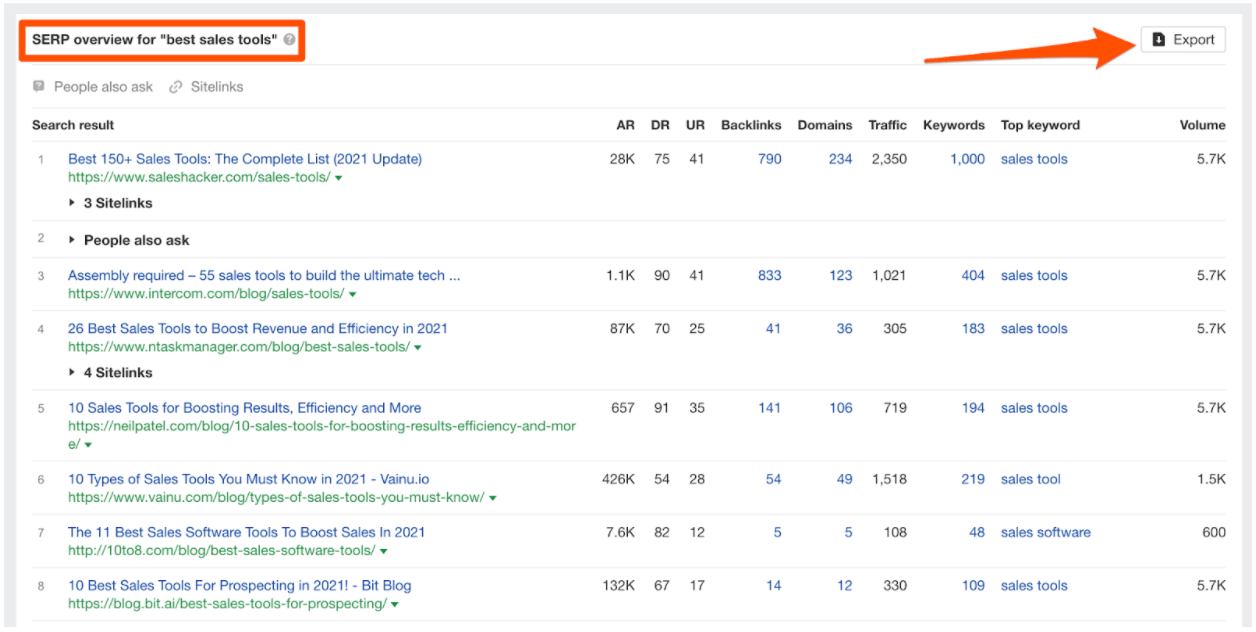 Repeat it for all of the keyword ideas you generate with your spreadsheet. Then, merge all CSVs you collected with Ahrefs in one.
Repeat it for all of the keyword ideas you generate with your spreadsheet. Then, merge all CSVs you collected with Ahrefs in one.
In the merged CSV, make sure to remove duplicates (from this point, I suggest using Google Sheets). Here, you can find a quick guide on how to remove them.
After that, it’s time to do some manual work, which is a bit time-consuming but very rewarding in the end.
Open each URL you exported. Remove the irrelevant ones or those that are not listicles. Add a sequence tag for each email. You’ll use it to personalize outreach.
In our case, we used four key tags:
- Hunter not mentioned (our product is not mentioned in the listicle)
- Hunter mentioned below (our product’s position is below #1 in the listicle)
- Hunter mentioned #1 with no link (no need to pitch the product, only ask to add a backlink)
- Hunter mentioned #1 with a link (no need to contact this website)
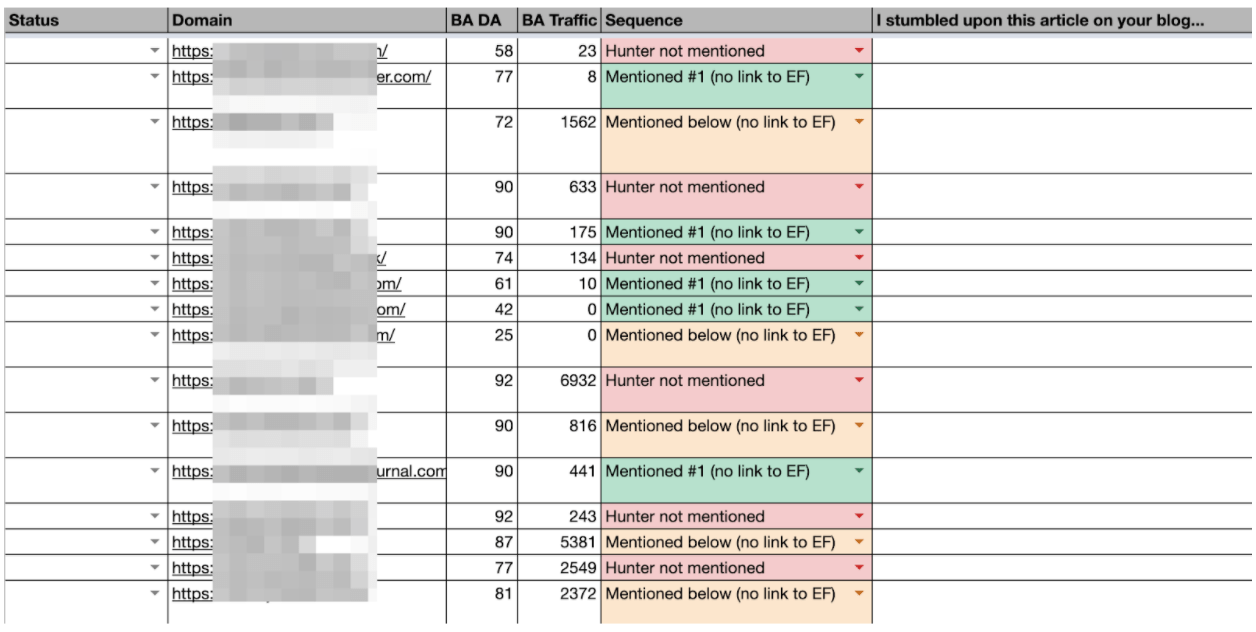 Besides adding a sequence tag for each relevant listicle, you’ll want to add a sentence of personalization to your spreadsheet that you’ll be using in your automated outreach sequence as an icebreaker.
Besides adding a sequence tag for each relevant listicle, you’ll want to add a sentence of personalization to your spreadsheet that you’ll be using in your automated outreach sequence as an icebreaker.
This is what it looked like in our spreadsheet:

I recommend exporting from Ahrefs monthly traffic and domain authority of the URLs you collected. That helps to set your team’s priorities better. You should focus on the pages with the highest traffic and highest domain authority.
Once you complete this step, it’s time to find decision-makers in those companies and their emails.
As we noticed, the highest response rate for the listicle outreach was from the blog editors and content managers, so I recommend focusing on these positions. In small companies, it could be marketers and business owners.
You can easily find the full name of the decision-maker from a specific company just by checking the company’s LinkedIn profile.
Once you know the full name of your prospect, enter it in Email Finder along with a company domain. You’ll get a verified email address in seconds. With Email Finder, you can search 25 emails/mo for free.
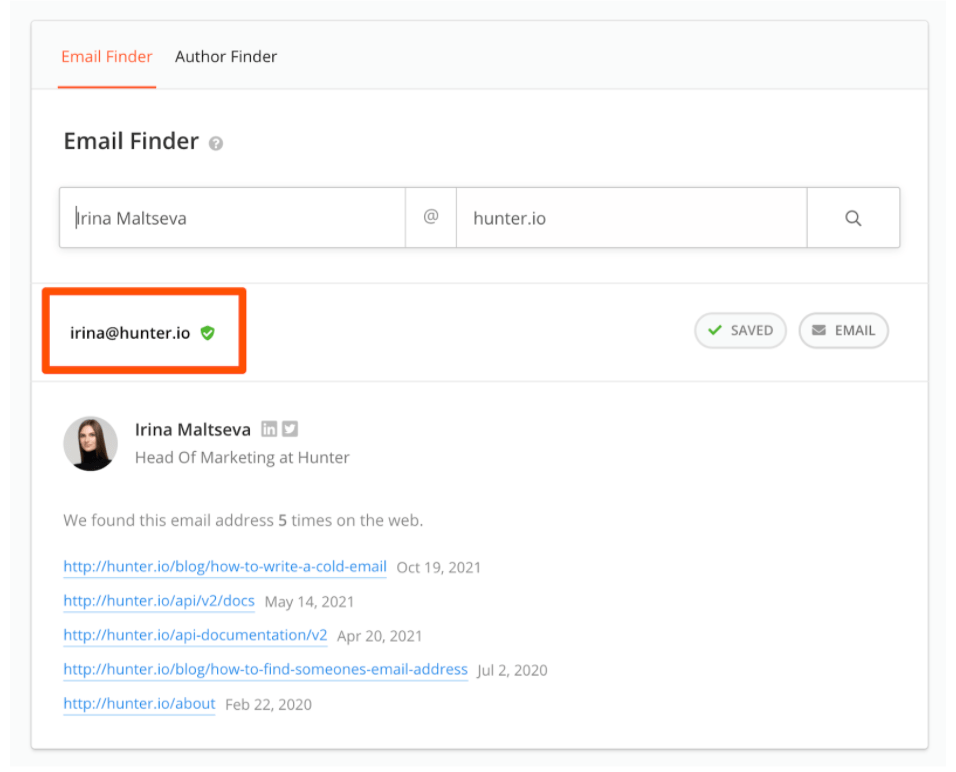 Another quick way to find the email addresses of the listicle authors is to use Author Finder. If you install a free Chrome extension, you can simplify the email lookup process even more.
Another quick way to find the email addresses of the listicle authors is to use Author Finder. If you install a free Chrome extension, you can simplify the email lookup process even more.
Just open the listicle URL and click on the extension icon. You’ll get the email address of the listicle author.
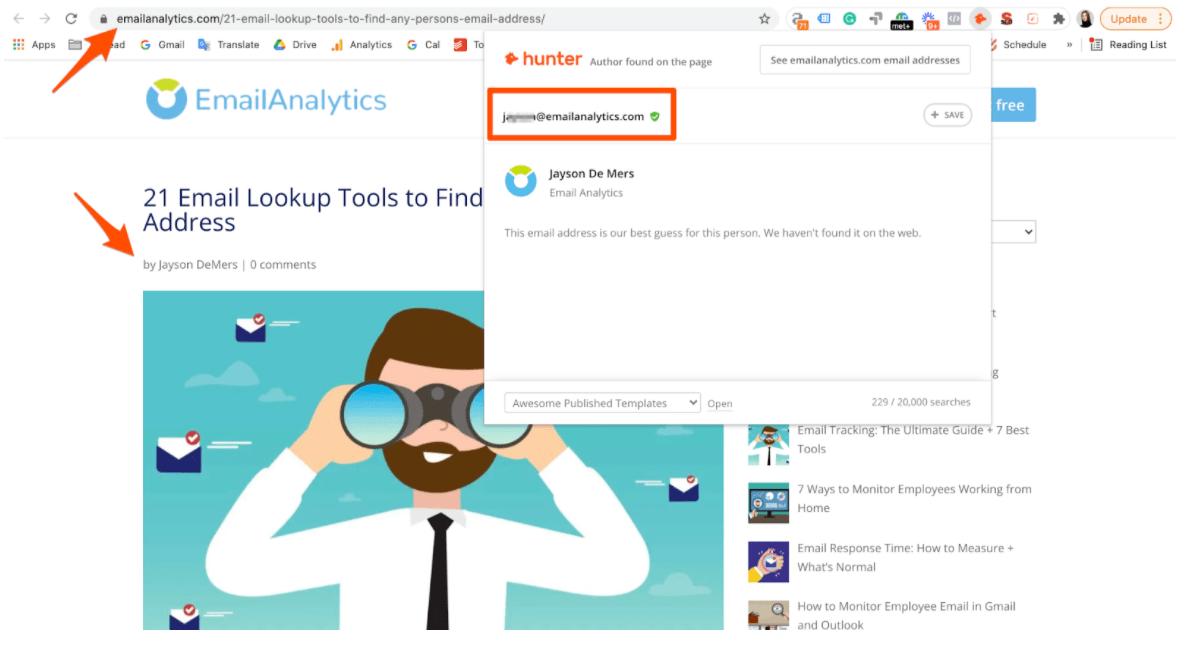 Add columns to your spreadsheet, such as the prospect’s name, company, and email address. You’ll use it later to personalize outreach.
Add columns to your spreadsheet, such as the prospect’s name, company, and email address. You’ll use it later to personalize outreach.
Note: If you find emails with other providers, verify them. Using unverified emails may cause bounces, which can hurt your deliverability rates.
Step 2: Prepare email copy.
Now, it’s time to prepare an email copy for your cold outreach.
It’s essential to segment your outreach sequences, personalize your emails on a high level, and provide maximum value to your prospects.
For our outreach, we created three sequences:
- Those who didn’t mention our product
- Those who mentioned our product but below other products
- And for those who mentioned but didn’t link back to us
Here is an example of the email we sent for those listicles that mentioned other products from our niche but didn’t mention us.
-Nov-24-2021-05-16-07-03-PM.png?width=624&height=620&name=HubSpot%20Link%20Building%20Via%20Best%20Listicles%20(Hunters%20Case%20Study)-Nov-24-2021-05-16-07-03-PM.png)
There’re a few critical things to include in your email copy when reaching out to listicles:
- Short and catchy subject line. No one will ever respond to you if no one opens your email in the first place. Thus, the first thing to do while working on a new cold email campaign is to create the perfect subject line. Keep it short and catchy so your reader isn’t overwhelmed or lost. Instead, make them intrigued and engaged.
- Quick intro and catchy opening line. After the subject line, the opening line is the second most crucial sentence in your cold email. Because you wrote a successful subject line and made prospects open your email, the next step would be to make them read your message. If you start with something blurry, dull, and generic, chances are you’ll never get a response from your prospect. At this step, it’s essential to add a personalized icebreaker. (This is the reason we added this personalized line about each article to our Google Sheet earlier.)
- Personalize at scale with custom attributes. When you send dozens of emails simultaneously, it might be time-consuming to do it all manually. Here is where cold outreach automation tools come in handy. Create a spreadsheet with all data to personalize your emails and then add custom attributes to email copy. Your emails will be personalized on a high level automatically, and you don’t need to do tons of manual work.
- Provide value in return. You can’t ask a stranger for an offer and not give anything in return. Offer them the option to participate in your affiliate program, or help with the content update or promotion. Think of anything that can bring them value.
- End your email with a powerful CTA. It’s essential how you end your emails since it directly impacts the response rate. Ask an open-ended question that requires no time to get an answer. Make it clear and straightforward.
Step 3: Set-up outreach campaign.
Cold outreach is a time-consuming process, but when you find the right approach to automate it, you won’t need to spend that much time on your campaigns.
For our listicle outreach campaign, we knew two things we planned to do:
- We would need to send highly-personalized emails to our prospects.
- We would need to send follow-ups as they significantly increase the response rate (typically).
When you have hundreds or even thousands of prospects to outreach, the thing that you don’t want to do is to write every single email from scratch.
Also, you might find it overwhelming to remember when you need to follow up with every prospect. When you have more than one follow-up for each, doing it manually may sound like a nightmare.
So, this is the point where you need to use intelligent automation.
For the listicle outreach, we used Campaigns, a free tool that helps to automate cold emailing directly from your Gmail account.
As I mentioned above, we used custom attributes to automate personalization at scale. You need to spend time collecting all data for personalization before the outreach. Then, you just import it from your spreadsheet and have highly-personalized emails in a single click.
Here is how the final email we sent looked: personal and relevant to the prospect.
-Nov-24-2021-05-16-05-72-PM.png)
We also added two automated follow-ups to the sequence that used the personalization from the spreadsheet. The rule was to send the 1st follow-up in three days to all those who didn’t respond, and a 2nd in six days after the initial email.
-2.png?width=624&name=HubSpot%20Link%20Building%20Via%20Best%20Listicles%20(Hunters%20Case%20Study)-2.png)
When scheduling cold follow-ups, it’s essential to:
- Not schedule too many follow-ups. Our crucial rule is to focus on writing irresistible emails instead of adding too many follow-ups. So we recommend limiting it to three follow-ups for your cold email campaigns. If you are sending too many follow-ups to someone who’s never heard about you, you may seem like an annoying person and damage your brand reputation.
- Use the same thread for all emails. This way, prospects quickly get reminded about the offer from the previous email. Moreover, you can use follow-ups to continue telling the story or offering additional benefits, in this case.
- Keep in mind a sending schedule. According to many studies, when you automate outreach, you’ll want to make sure you exclude from your sending window weekends and public holidays.
Step 4: Be proactive in negotiations.
Your cold outreach campaign doesn’t end when you hit “send.” Your negotiation skills and proactivity determine how successful your outreach campaign will be.
In the perfect world, each answer you receive to the listicle outreach campaign looks like this:
-4.png?width=624&name=HubSpot%20Link%20Building%20Via%20Best%20Listicles%20(Hunters%20Case%20Study)-4.png)
The thing is that we don’t live in a perfect world, and most of the prospects will try to get more benefits for you in exchange for a link, product mention, or position upgrade. So, be ready to negotiate!
Here are a few tips that helped us to get the most mentions after receiving answers from our prospects:
- Be fast and provide what you offered right away. It doesn’t mean you have to skip sleep and update your inbox regularly. Just answer as soon as you see an email.
- Be flexible. If you contacted a DR 90 website and the traffic to the desired listicle is 1K sessions, be flexible in negotiations. You don’t want to lose a “big fish.”
- Do something for them. You get more chances of being featured if you provide even more value in return. Offer to share content after the update or give free consultation on something you’re good at.
- Don’t forget to follow up. Make sure to schedule manual follow-ups for those who showed interest. Sometimes, people are just busy at the moment you send an email or can forget about the conversation. It’s OK. Just make sure to follow up regarding your conversation gently. You can use Gmail functionality to snooze conversations and get a reminder to follow up on a specific date.
- Track all negotiations. Update your spreadsheet regularly and keep track of all negotiations. If you have too many prospects to handle, use a CRM.
.png?width=624&height=392&name=HubSpot%20Link%20Building%20Via%20Best%20Listicles%20(Hunters%20Case%20Study).png)
Link building via “best” listicles is an effective strategy that can help to get tons of mentions and links for your business — if you do it right.
Make sure to spend enough time researching your potential prospects and collecting in-depth information on them.
Prepare email sequences that are unique and relevant to each segment, and add ice breakers and information pertinent to bring value to your prospects.
Automate routine work by using tools for cold outreach, and at the same time, spend as much time as needed on negotiations.
Hopefully, you’ll begin to see powerful results from your listicle outreach almost immediately.



